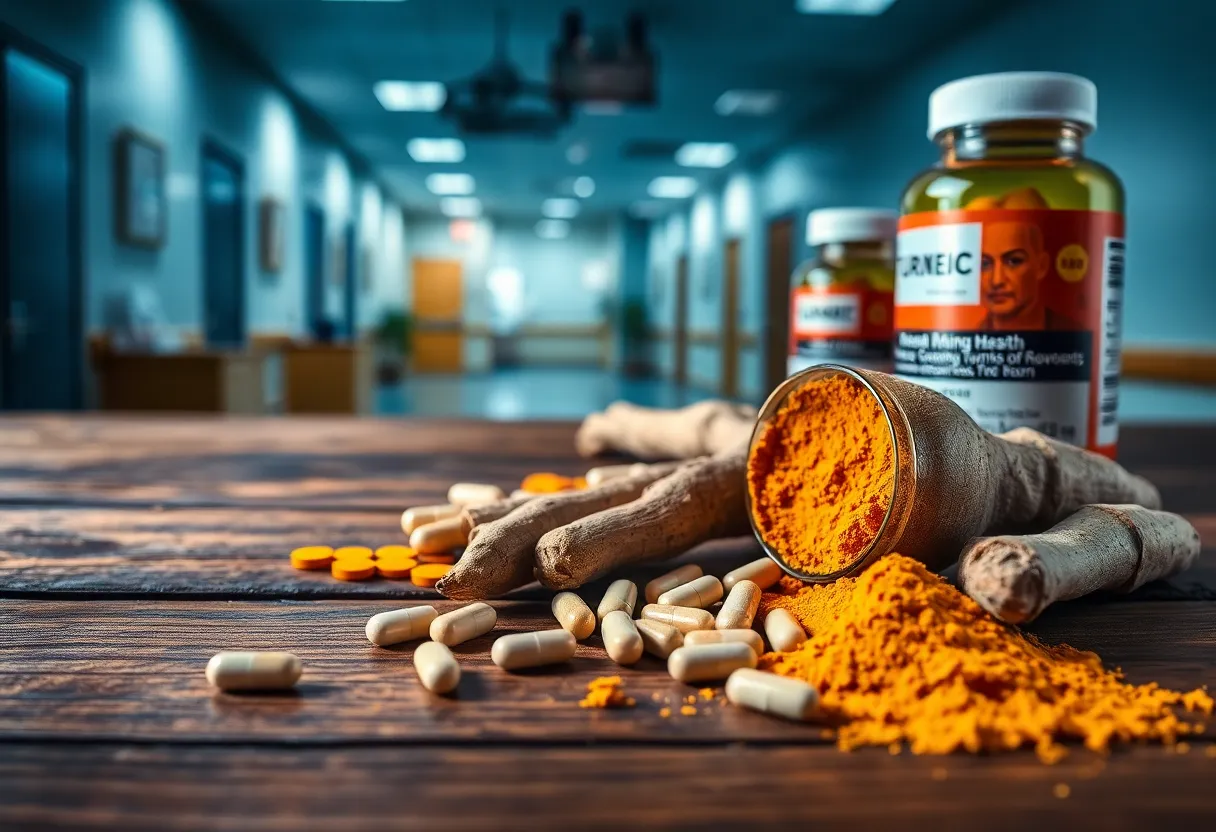News Summary
A woman in New Jersey was hospitalized for severe liver toxicity after taking high doses of turmeric supplements. This case highlights the dangers of excessive herbal supplement use. Medical professionals noted her liver enzyme levels were alarmingly elevated, posing imminent risk of failure. Experts warn that the popularity of turmeric, often promoted for its health benefits, can lead to serious health risks when consumed in large quantities, especially among vulnerable populations. The case serves as a critical reminder that ‘natural’ does not always mean safe.
New Jersey Woman Hospitalized After Severe Liver Toxicity Linked to High Dosage of Turmeric Supplements
A 57-year-old woman from New Jersey has been hospitalized due to severe liver toxicity resulting from excessive intake of turmeric supplements. This alarming case highlights the potential risks associated with popular herbal supplements, especially when taken in excessive quantities.
The woman began taking high doses of turmeric pills in March after being influenced by a social media promotion touting its anti-inflammatory and pain-relieving benefits. Within weeks of initiating this regimen, she experienced severe symptoms including stomach pain, nausea, fatigue, and darkened urine. Medical examinations revealed that her liver enzyme levels were alarmingly elevated, measuring 70 times above normal levels and putting her at imminent risk of complete liver failure.
Due to the significant liver damage caused by the supplements, healthcare professionals warned that she might require a liver transplant, underscoring the seriousness of her situation. Luckily, after six days of hospitalization and treatment, her liver began to show signs of recovery.
Understanding Turmeric and Its Risks
The active compound in turmeric, curcumin, is known for its antioxidant and anti-inflammatory properties. However, the safe daily dose of curcumin for most adults falls between 500 to 2000 mg. The supplements in question often contain a much higher concentration, with up to 95% curcumin compared to just 3% found in culinary uses of the spice. In this woman’s case, her daily intake was a staggering 2,250 mg, far exceeding recognized safety limits.
Experts explain that individual digestive capabilities can vary, and high doses of turmeric can lead to adverse effects, particularly concerning liver health. The Drug-Induced Liver Injury Network has observed a marked increase in cases of liver damage resulting from herbal supplements, with 19% of these cases linked directly to such products. Furthermore, reports suggest that turmeric is frequently associated with cases of toxic hepatitis in the United States, with herbal and dietary supplements accounting for 20% of liver toxicity incidents.
Vulnerable Populations and Symptoms
Individuals with pre-existing liver conditions, such as fatty liver disease or alcoholic liver disease, are particularly vulnerable and advised to steer clear of turmeric supplements due to the heightened risk of drug-induced liver injury (DILI). Common symptoms of liver toxicity associated with supplements include yellow urine, abdominal heaviness, fatigue, and weakness.
The World Health Organization recommends an acceptable daily intake of turmeric ranging from 0 to 3 mg per kilogram of body weight. As such, it is crucial for consumers to adhere to guidelines to mitigate the risk of adverse health effects.
The Growing Trend and Conclusion
The increasing popularity of herbal supplements has coincided with a noticeable rise in serious health risks. Between 1995 and 2020, the number of liver failure cases requiring transplants due to supplements reportedly increased eightfold in the U.S. This trend is a cause for significant concern among medical professionals and public health advocates.
In light of her experience, the New Jersey woman has vowed to avoid all herbal supplements in the future. This case serves as a critical reminder that “natural” does not always equate to safe. Consumers are advised to remain cautious and well-informed about the risks posed by high doses of dietary supplements, particularly those known to affect liver health. The combination of turmeric with black pepper, which can enhance absorption, further escalates this risk.
Deeper Dive: News & Info About This Topic
HERE Resources
Additional Resources
- New York Post
- Wikipedia: Turmeric
- Indian Express
- Google Search: liver damage turmeric supplement
- NBC News
- Encyclopedia Britannica: liver toxicity
- Times of India
- Google Scholar: turmeric supplements liver toxicity
Author: STAFF HERE LOS ANGELES WRITER
The LOS ANGELES STAFF WRITER represents the experienced team at HERELosAngeles.com, your go-to source for actionable local news and information in Los Angeles, Los Angeles County, and beyond, specializing in "news you can use" with coverage of product reviews for personal and business needs, local business directories, politics, real estate trends, neighborhood insights, and state news affecting the area—with deep expertise from years of dedicated reporting and strong community input, including local press releases and business updates, while delivering top reporting on high-value events like the Academy Awards, LA Auto Show, and Los Angeles Marathon, extending coverage to key organizations such as the Los Angeles Area Chamber of Commerce and the Los Angeles Tourism & Convention Board, plus leading businesses in entertainment and technology like Warner Bros. and SpaceX, and as part of the broader HERE network including HEREAnaheim.com , HERECostaMesa.com , HEREHuntingtonBeach.com , and HERESantaAna.com , providing comprehensive, credible insights into Southern California's dynamic landscape. HERE Anaheim HERE Beverly Hills HERE Coronado HERE Costa Mesa HERE Hollywood HERE Huntington Beach HERE Long Beach HERE Los Angeles HERE Mission Viejo HERE San Diego HERE Santa Ana





